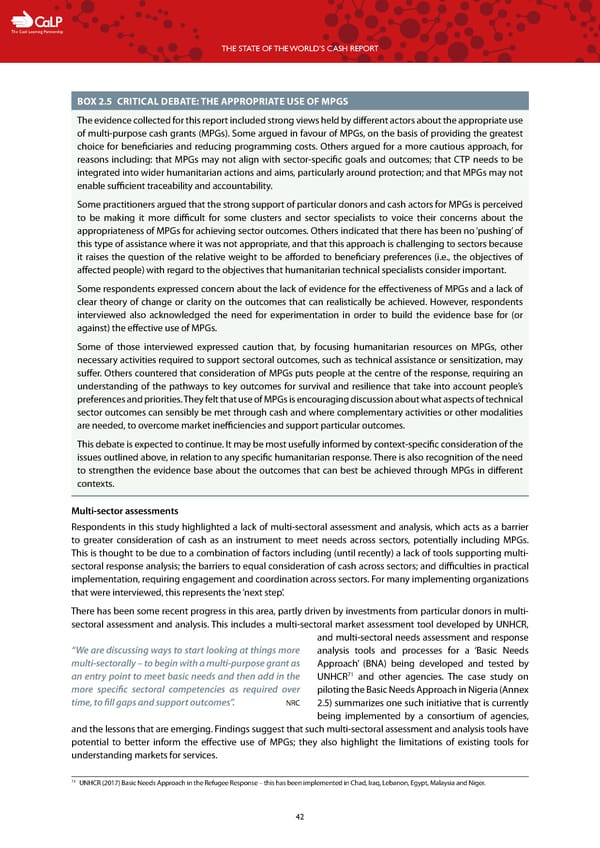C The Cash Learning Partnership THE STATE OF THE WORLD’S CASH REPORT BOX 2.5 CRITICAL DEBATE: THE APPROPRIATE USE OF MPGS The evidence collected for this report included strong views held by different actors about the appropriate use of multi-purpose cash grants (MPGs). Some argued in favour of MPGs, on the basis of providing the greatest choice for beneficiaries and reducing programming costs. Others argued for a more cautious approach, for reasons including: that MPGs may not align with sector-specific goals and outcomes; that CTP needs to be integrated into wider humanitarian actions and aims, particularly around protection; and that MPGs may not enable sufficient traceability and accountability. Some practitioners argued that the strong support of particular donors and cash actors for MPGs is perceived to be making it more difficult for some clusters and sector specialists to voice their concerns about the appropriateness of MPGs for achieving sector outcomes. Others indicated that there has been no ‘pushing’ of this type of assistance where it was not appropriate, and that this approach is challenging to sectors because it raises the question of the relative weight to be afforded to beneficiary preferences (i.e., the objectives of affected people) with regard to the objectives that humanitarian technical specialists consider important. Some respondents expressed concern about the lack of evidence for the effectiveness of MPGs and a lack of clear theory of change or clarity on the outcomes that can realistically be achieved. However, respondents interviewed also acknowledged the need for experimentation in order to build the evidence base for (or against) the effective use of MPGs. Some of those interviewed expressed caution that, by focusing humanitarian resources on MPGs, other necessary activities required to support sectoral outcomes, such as technical assistance or sensitization, may suffer. Others countered that consideration of MPGs puts people at the centre of the response, requiring an understanding of the pathways to key outcomes for survival and resilience that take into account people’s preferences and priorities. They felt that use of MPGs is encouraging discussion about what aspects of technical sector outcomes can sensibly be met through cash and where complementary activities or other modalities are needed, to overcome market inefficiencies and support particular outcomes. This debate is expected to continue. It may be most usefully informed by context-specific consideration of the issues outlined above, in relation to any specific humanitarian response. There is also recognition of the need to strengthen the evidence base about the outcomes that can best be achieved through MPGs in different contexts. Multi-sector assessments Respondents in this study highlighted a lack of multi-sectoral assessment and analysis, which acts as a barrier to greater consideration of cash as an instrument to meet needs across sectors, potentially including MPGs. This is thought to be due to a combination of factors including (until recently) a lack of tools supporting multi- sectoral response analysis; the barriers to equal consideration of cash across sectors; and difficulties in practical implementation, requiring engagement and coordination across sectors. For many implementing organizations that were interviewed, this represents the ‘next step’. There has been some recent progress in this area, partly driven by investments from particular donors in multi- sectoral assessment and analysis. This includes a multi-sectoral market assessment tool developed by UNHCR, and multi-sectoral needs assessment and response “We are discussing ways to start looking at things more analysis tools and processes for a ‘Basic Needs multi-sectorally – to begin with a multi-purpose grant as Approach’ (BNA) being developed and tested by an entry point to meet basic needs and then add in the 71 UNHCR and other agencies. The case study on more specific sectoral competencies as required over piloting the Basic Needs Approach in Nigeria (Annex time, to fill gaps and support outcomes”. NRC 2.5) summarizes one such initiative that is currently being implemented by a consortium of agencies, and the lessons that are emerging. Findings suggest that such multi-sectoral assessment and analysis tools have potential to better inform the effective use of MPGs; they also highlight the limitations of existing tools for understanding markets for services. 71 UNHCR (2017) Basic Needs Approach in the Refugee Response – this has been implemented in Chad, Iraq, Lebanon, Egypt, Malaysia and Niger. 42
 The State of the World's Cash | Full Report Page 43 Page 45
The State of the World's Cash | Full Report Page 43 Page 45